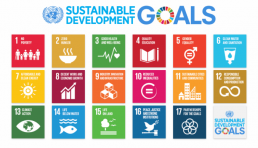By the time you read this blog, no matter where in the world you are, most of us are likely to have experienced at least a few days confined at home. We are juggling the challenges of remote working, supporting children in their remote schooling, and a very different lifestyle in general as a result of the COVID-19 crisis.
As with sustainability and climate change-related challenges, the virus has no respect for political, geographical, or religious boundaries. It has made it obvious what a globalised society and economy we live in, and how interdependent we all are.
Amid all the negative news, it is important to keep track of the silver linings this crisis enables from a sustainability perspective. And particularly, when it comes to the role of technology in this crisis, there are plenty of those right now.
Technology is Part of the Solution

If we take the United Nations 17 SDGs (Sustainable Development Goals) into consideration, COVID-19 is likely to impact all of them for better or worse. We see technology providing excellent support to mitigate the negative effects of this crisis across all those 17 Goals, in particular:
#3 Good Health and Well-Being
Now more than ever we face the challenge of providing resilient healthcare services. Some solutions can provide welcome support to those in hospital and at home. From IoT-based remote health monitoring or bedside telemetry, to robots and drones used in quarantined hospitals, which can help alleviate the burden on some medical staff (carrying equipment, sterilisation tasks, etc).
#4 Quality Education
The negative impact of schools closing can be devastating. Not only from an educational perspective, but from a humanitarian one (many schools provide a healthy meal and refuge to children in need). There are many remote schooling platforms, such as Cisco Webex Education, Google Classroom and Zoom.
Many of these vendors have currently upgraded their free versions with extra functionalities. The role of cloud services providers offering extra support and capacity to enable these free versions is also key in this situation.
#12 Responsible Consumption and Production
This crisis is forcing many retailers and manufacturers to rethink their current supply chains. Both upstream and downstream.
Circular economy principles can enable the reuse of discarded items and materials. Equally, they can help enable supply chain traceability and waste management practices.
All these can reduce vulnerabilities and help increase resiliency. In the weeks and months to come they will become high items on the agenda of many board meetings.
Topolytics, for example, enables organisations to trace their waste through data aggregation and analytics. SGS Transparency One is enabling the digitisation of the supply chain to provide product traceability and transparency. Society will demand this increasingly, particularly after a crisis like this.
#17 Partnerships
In recent weeks, the number of private-public partnerships has grown exponentially. This is the effect of a clear need to identify rapid solutions and provide much needed resources.
These have enabled the creation of remote monitoring apps to trace the movement of people. The use of technologies such as 3D, AI and IoT to speed up the deployment of materials is also widespread. From enabling vaccine tests to 3D printed respirators.
The list goes on.
A Brighter Future
Above all, this crisis is providing a training ground for companies to consider the parts of the business that can — and must — be digitised. This will be a key requirement in order to become more resilient for the future. Sustainability is, now more than ever, synonymous with business continuity and resiliency.
The COVID-19 crisis will make it relatively easy to discern which organisations and governments are really committed to their sustainability goals and intentions. The main need in the short term will be the medical and economic support for those most affected by this pandemic.
However, the medium to long term commitment to sustainability should remain in place, especially now that we have experienced both the positive and the negative aspects of this crisis first-hand.
We hope that the new partnerships, altruistic engagements and flexible working policies that we have seen during these weeks will persist long after the crisis. We also hope these will become embedded to enable a more engaged and collaborative global society.
If you wish to hear more about how technology can impact your sustainability goals during and beyond the COVID-19 crisis, take a look at the IDC EMEA new Subscription Service: Technology for Sustainability and Social Impact or contact Marta Muñoz or head over to https://www.idc.com/eu.



